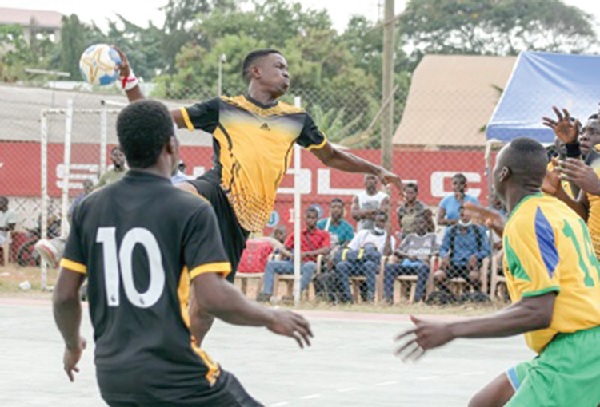
Harnessing potential of a growing sport: Handball in perspective
After its introduction in the country in 1975, handball has become the pastime of officers in the various security services and few other civilian clubs.
The sport labelled as least financed sporting discipline by officialdom receive no support or attention from the state.
But over the past four decades it has become a catapult on which many youth held on to swing to the various security services and eke out a living.
Today, the game is a globally-popular professional sport, with the event revenue of the International Handball Federation (IHF) set to exceed the 30 million euro mark in 2023.
The highest-paid handball players themselves can also earn millions, with France’s Nikola Karabatić earning an estimated 1.8 million euros per year.
However, handball is not just for players at elite clubs: IHF figures on global handball participation revealed that an estimated 30 million people play the sport worldwide, in nearly 130,000 teams according to Statista.com.
Handball in Ghana
In recent years, the sport of handball has gained considerable popularity in Ghana, thanks to the efforts of passionate individuals and organizations striving to develop the game at grassroot levels.
Handball is a fast-paced and thrilling indoor sport and has now captured the attention of Ghanaians, contributing to the country's ever-evolving sporting landscape.
Recognizing the immense potential in the sport, various stakeholders, including the Ghana Handball Association (GHA), government bodies, and corporate entities, are coming forward to support and promote handball at both national and regional levels.
The Greater Accra Handball League (GAHAL) is partly responsible for this awareness creation and the recently held Men’s Handball Tournament Africa – Zone III, tournament which took place last year in Accra also shone some spotlight on the sport.
But aside it being paramountly staged in Greater Accra, and providing few jobs for those in the security services, the sport faces daunting challenges in the country.
Successive governments have left it at the mercy of few individuals and sports personalities who have used it as a pawn to achieve their personal objectives and selfish parochial interests.
Key strategies
One of the key strategies to develop handball in Ghana is through infrastructure development.
The construction and modernization of dedicated handball courts and facilities across the country are crucial for ensuring proper training and hosting competitive events.
Investments must be directed towards constructing state-of-the-art facilities that meet international standards, encouraging more players to embrace the sport, and fostering a competitive spirit.
Another vital aspect of the development process is organizing regular leagues, tournaments, and championships at various levels.
By hosting such events, players gain the opportunity to showcase their skills, improve their game, and engage in healthy competition.
In addition, these leagues, tournaments and championships allow scouts and talent managers to identify promising players who can be groomed for national and international competitions.
Government support, alongside corporate sponsorships, is essential to establish a sustainable and well-structured competition framework.
Fostering a strong handball culture and nurturing talent from a young age is imperative. Schools and colleges play a crucial role in fostering interest and skill development.
Establishing handball programmes and including the sport in physical education curricula can help identify and nurture talented players from a young age.
Partnerships with local clubs and international organizations can provide access to expert coaching and specialized training programmes, enhancing skill development and game knowledge among players.
To promote inclusivity and gender equality in handball, efforts are being made to encourage female participation in the sport.
Female handball leagues, workshops, and seminars are being organized to empower and train women athletes.
Developing handball for economic growth
1. Increased funding: The Ghanaian government and private sector organizations need to dedicate financial resources to support handball development. Investment in training programs, infrastructure, and equipment would provide the necessary impetus to grow the sport.
2. Grassroots development: Identifying and nurturing talent at an early stage is crucial. Establishing handball development programs in schools, clubs, and community centers would create a foundation for sustainable growth.
3. Public-private partnerships: Collaboration between the government, sports associations, and private organizations is essential for the successful development of handball. Partnerships can provide financial support, expertise, and access to resources required for effective implementation.
4. Media and marketing efforts: Raising awareness about handball through increased media coverage, broadcasting rights, and marketing campaigns can help garner public interest and attract sponsors.
This would also create a fan base, generating revenue through ticket sales, merchandise, and media rights.